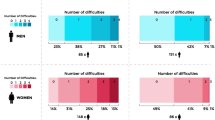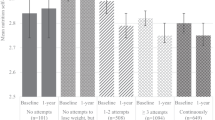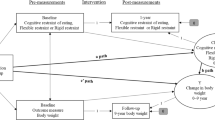Abstract
OBJECTIVE: To assess the effect of a 3 month behaviour modification weight management programme on self-efficacy and anthropometric variables among obese women seeking treatment at an obesity management clinic and to compare self-efficacy among these obese women to non-obese women.
DESIGN: Cross sectional.
SUBJECTS: A total of 161 non-obese (BMI 22.6±2.9 kg/m2) and 138 obese (BMI 37.7±5.8 kg/m2) women of similar age.
MEASUREMENTS: Self-efficacy in relation to eating was assessed by the Weight Efficacy Lifestyle (WEL) questionnaire. Demographic information was obtained by interview and questionnaire in the obese and by questionnaire in the non-obese. Anthropometric measurements were obtained by direct measure in the obese and BMI was calculated from self-reported weight and height in the non-obese.
RESULTS: At entry to the programme obese women scored significantly less (P<0.0001) than non-obese women on the WEL (99.4±34.1 vs 139.0±24.9). Women who completed the programme (n=65) demonstrated a decrease in waist circumference of 3.9±5.3 cm, a 10.0±11.5% loss of excess weight and a significant improvement in total WEL score from 106.0±30.3 to 126.5±28.4.
CONCLUSION: Improvements in some dimensions of self-efficacy among obese women were of sufficient magnitude to attain scores similar to women of a normal weight. The WEL questionnaire may provide an additional measure of success as well as provide positive feedback and encouragement to the client.
This is a preview of subscription content, access via your institution
Access options
Subscribe to this journal
Receive 12 print issues and online access
$259.00 per year
only $21.58 per issue
Buy this article
- Purchase on Springer Link
- Instant access to full article PDF
Prices may be subject to local taxes which are calculated during checkout
Similar content being viewed by others
References
Kuczmarski RJ, Flegal KM, Campbell SM, Johnson CL . Increasing prevalence of overweight among US adults The National Health and Nutrition Examination Surveys 1960 to 1991 JAMA 1994 272: 205–211.
National Nutritional Survey selected highlights Australia, 1995 ABS Catalogue no. 4802.0. Australian Bureau of Statistics Commonwealth Department of Health and Family Services: Canberra 1997.
Jeffery RW, Wing RR, Thorson C, Burton LR, Raether C, Harvey J, Mullen M . Strengthening behavioral interventions for weight loss: a randomized trial of food provision and monetary incentives J Consult Clin Psychol 1993 61: 1038–1045.
Wing RR, Jeffery RW, Burton LR, Thorson C, Nissinoff KS, Baxter EJ . Food provision vs structured meal plans in the behavioral treatment of obesity Int J Obes Relat Metab Disord 1996 20: 56–62.
Wood P, Stefanik ML, Williams PT, Haskell WL . The effects on plasma lipoproteins of a prudent weight reducing diet, with or without exercise, in overweight men and women New Eng J Med 1991 325: 461–466.
Kramer FM, Jeffery RW, Forster JL, Snell MK . Long-term followup of behavioral treatment for obesity: pattern of weight regain among men and women Int J Obes 1989 13: 123–136.
Lavery MA, Loewy JW . Identifying predictive variables for long term weight change after participation in a weight loss program J Am Diet Assoc 1993 93: 1017–1024.
Shick SM, Wing RR, Klem ML, McGuire MT, Hill JO, Seagle H . Persons successful at long term weight loss and maintenance continue to consume low energy, low fat diet J Am Diet Assoc 1998 98: 408–413.
Wadden TA, Foster GD, Wang J, Pierson RN, Yang MU, Moreland K, Stunkard AJ, Van Itallie TB . Clinical correlates of short and long term weight loss Am J Clin Nutr 1992 56 (Suppl): 271S–274S.
Goldstein DJ . Beneficial health effects of modest weight loss Int J Obes 1991 16: 397–415.
Bosello O, Armellini F, Zamboni M, Fitchet M . The benefits of modest weight loss in type II diabetes Int J Obes Relat Metab Disord 1997 21 (Suppl 1): S10–S13.
Wing RR, Shoemaker M, Marcus MD, McDermott M, Gooding W . Variables associated with weight loss and improvements in glycaemic control in type II diabetic patients in behavioural weight control programmes Int J Obes 1990 14: 495–503.
Wadden TA, Stein SN, Wingate BJ, Foster GD . Psychosocial consequences of weight reduction: how much weight loss is enough? Am J Clin Nutr 1996 63 (Suppl): 461S–465S.
Pratt CA . A conceptual model for studying attrition in weight-reduction programs Soc Nutr Edu 1990 22: 177–182.
Annis HM, Davis CS . Assessment of expectancies. In: DM Donovon & GA Marlett (eds) Assessment of addictive behaviors. Guildford Press: New York 1988 84–111.
Burling TA, Reilly PM, Moltzen JO, Ziff DC . Self-efficacy and relapse among inpatient drug and alcohol abusers: a predictor of outcome J Stud Alcohol 1989 56: 354–360.
Dennis KE, Goldberg AP . Weight control self-efficacy types and transitions affect weight-loss outcomes in obese women Addict Behav 1996 21: 103–116.
Edell BH, Edington S, Herd B, O'Brien, RM, Witkin G . Self-efficacy and self motivation as predictors of weight loss Addict Behav 1987 12: 63–66.
Stotland S, Zuroff DC . Relations between multiple measures of dieting self-efficacy and weight change in weight control program Behav Ther 1991 22: 47–59.
Clark MM, Cargill BR, Medeiros ML, Pera V . Changes in self-efficacy following obesity treatment Obes Res 1996 4: 179–181.
Pinto BM, Clark MM, Cruess DG, Szymanski L, Pera V . Changes in self-efficacy and decisional balance for exercise among obese women in a weight management program Obes Res 1999 7: 288–292.
Fontaine KR, Cheskin LJ . Self-efficacy, attendance and weight loss in obesity treatment Addict Behav 1997 22: 567–570.
Bernier M, Avard J . Self-efficacy, outcome and attrition in a weight-reduction program Cogn Ther Res 1986 10: 319–338.
Clark MM, Abrams DB, Niaura RS, Eaton CA, Rossi JS . Self-efficacy in weight management J Consult Clin Psychol 1991 59: 739–744.
Barker ME, Thompson KA, McClean SI . Attitudinal dimensions of food choice and nutrient intake Br J Nutr 1995 74: 649–659.
Stunkard A, Mendelson M . Disturbances in body image of some obese persons J Am Diet Assoc 1961 38: 328–331.
Rowland ML . Self reported weight and height Am J Clin Nutr 1990 52: 1125–1133.
Wing RR, Epstein LH, Ossip DJ, LaPorte RE . Reliability and validity of self-report and observers' estimates of relative weight Addict Behav 1979 4: 133–140.
Richman RM, Webster P, Salgo AK, Mira M, Steinbeck KS, Caterson ID . A shared care approach in obesity management: the general practitioner and a hospital based service Int J Obes Relat Metab Disord 1996 20: 413–419.
Domenech MI, Assad D, Mazzei ME, Kronsbein P, Gagliardino JJ . Evaluation of the effectiveness of an ambulatory teaching/treatment program for non-insulin dependent (type 2) diabetic patients Acta Diabetol 1995 32: 143–147.
Datillo AM, Kris-Etherton PM . Effects of weight reduction on blood lipids and lipoproteins: a meta-analysis Am J Clin Nutr 1992 56: 253–273.
Clark MM, Guise BJ, Niaura RS . Obesity level and attrition: support for patient treatment matching in obesity treatment Obes Res 1995 3: 63–64.
Cargill BR, Clark MM, Pera V, Niaura RS, Abrams DB . Binge eating, body image, depression and self-efficacy in an obese clinical population Obes Res 1999 7: 379–386.
King TK, Clark MM, Pera V . History of sexual abuse in obesity treatment outcome Addict Behav 1996 21: 283–290.
Author information
Authors and Affiliations
Corresponding author
Rights and permissions
About this article
Cite this article
Richman, R., Loughnan, G., Droulers, A. et al. Self-efficacy in relation to eating behaviour among obese and non-obese women. Int J Obes 25, 907–913 (2001). https://doi.org/10.1038/sj.ijo.0801606
Received:
Revised:
Accepted:
Published:
Issue Date:
DOI: https://doi.org/10.1038/sj.ijo.0801606
Keywords
This article is cited by
-
Low eating self-efficacy is associated with unfavorable eating behavior tendencies among individuals with overweight and obesity
Scientific Reports (2023)
-
The Balance protocol: a pragmatic weight gain prevention randomized controlled trial for medically vulnerable patients within primary care
BMC Public Health (2019)
-
A Cross Sectional Comparison of Predisposing, Reinforcing and Enabling Factors for Lifestyle Health Behaviours and Weight Gain in Healthy and Overweight Pregnant Women
Maternal and Child Health Journal (2017)
-
Home environment and psychosocial predictors of obesity status among community-residing men and women
International Journal of Obesity (2015)
-
Sentiment d’efficacité personnelle en activité physique adaptée chez la personne obèse
Obésité (2015)



